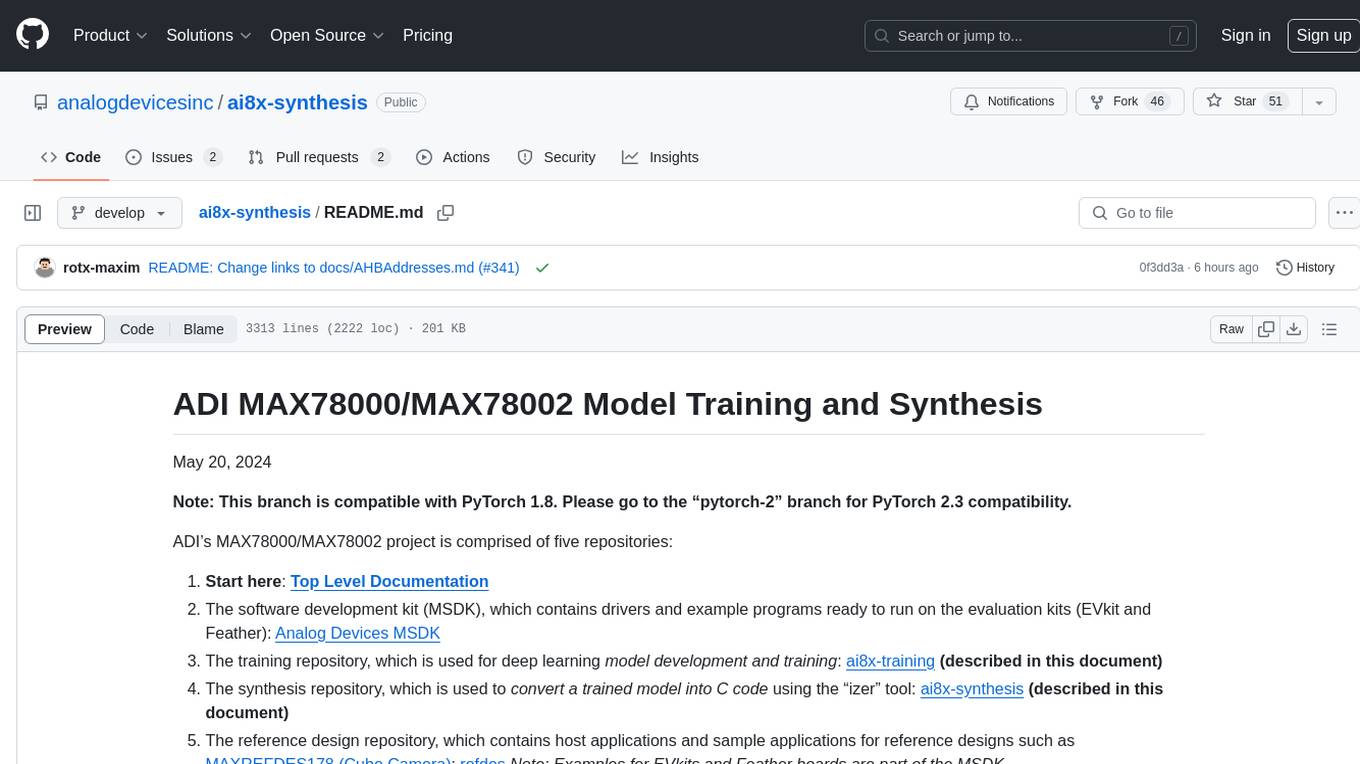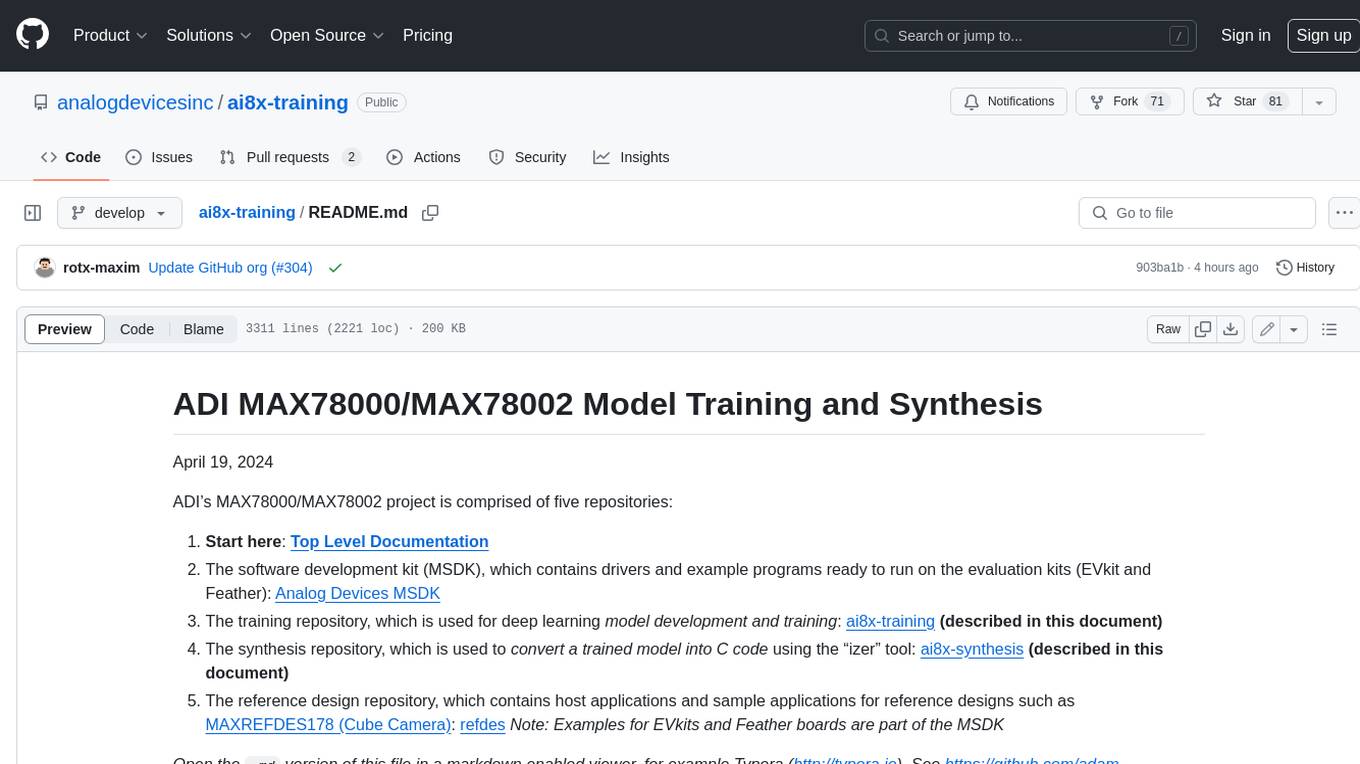
zipnn
A Lossless Compression Library for AI pipelines
Stars: 217
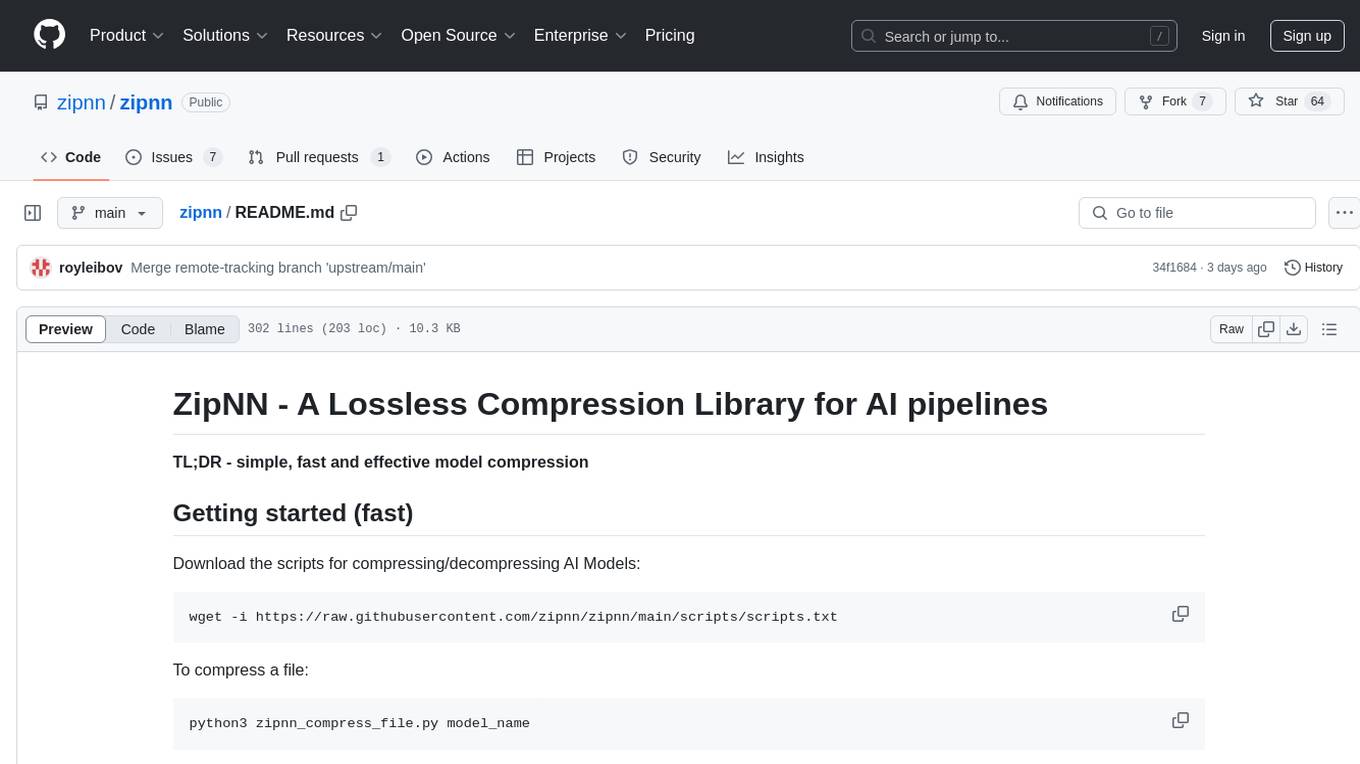
ZipNN is a lossless and near-lossless compression library optimized for numbers/tensors in the Foundation Models environment. It automatically prepares data for compression based on its type, allowing users to focus on core tasks without worrying about compression complexities. The library delivers effective compression techniques for different data types and structures, achieving high compression ratios and rates. ZipNN supports various compression methods like ZSTD, lz4, and snappy, and provides ready-made scripts for file compression/decompression. Users can also manually import the package to compress and decompress data. The library offers advanced configuration options for customization and validation tests for different input and compression types.
README:
TL;DR - simple, fast, and effective model compression.
arXiv Paper: "ZipNN: Lossless Compression for AI Models"
The default is set to the number of logical CPU threads.
Note: For compression, you might want to reduce the number of threads depending on your machine.
- NEW: HuggingFace Integration
- Getting Started
- Introduction
- Results
- Usage
- Examples
- Configuration
- Validation
- Support And Questions
- Contribution
- Citation
- Change Log
You can now choose to save the model compressed on your local storage by using the default plugin. When loading, the model includes a fast decompression phase on the CPU while remaining compressed on your storage.
What this means: Each time you load the model, less data is transferred to the GPU cluster, with decompression happening on the CPU.
zipnn_hf()Alternatively, you can save the model uncompressed on your local storage. This way, future loads won’t require a decompression phase.
zipnn_hf(replace_local_file=True)Click here to see full Hugging Face integration documentation, and to try state-of-the-art compressed models that are already present on HuggingFace, such as Roberta Base, Granite 3.0, Llama 3.2.
You can also try one of these python notebooks hosted on Kaggle: granite 3b, Llama 3.2, phi 3.5.
Download the scripts for compressing/decompressing AI Models:
wget -i https://raw.githubusercontent.com/zipnn/zipnn/main/scripts/scripts.txt
To compress a file:
python3 zipnn_compress_file.py model_name
To decompress a file:
python3 zipnn_decompress_file.py compressed_model_name.znn
In the realm of data compression, achieving a high compression/decompression ratio often requires careful consideration of the data types and the nature of the datasets being compressed. For instance, different strategies may be optimal for floating-point numbers compared to integers, and datasets in monotonic order may benefit from distinct preparations.
ZipNN (The NN stands for Neural Networks) is a lossless compression library optimized for numbers/tensors in the Foundation Models environment, designed to automatically prepare the data for compression according to its type. By simply calling zipnn.compress(data), users can rely on the package to apply the most effective compression technique under the hood.
Given a specific data set, ZipNN automatically rearranges the data according to it's type, and applies the most effective techniques for the given instance to improve compression ratios and speed. It is especially effective for BF16 models, typically saving 33% of the model size, whereas with models of type FP32 it usually reduces the model size by 17%.
Some of the techniques employed in ZipNN are described in our paper: Lossless and Near-Lossless Compression for Foundation Models A follow up version with a more complete description is under preparation.
Currently, ZipNN compression methods are implemented on CPUs, and GPU implementations are on the way.
Below is a comparison of compression results between ZipNN and several other methods on bfloat16 data.
| Compressor name | Compression ratio / Output size | Compression Throughput | Decompression Throughput |
|---|---|---|---|
| ZipNN v0.2.0 | 1.51 / 66.3% | 1120MB/sec | 1660MB/sec |
| ZSTD v1.56 | 1.27 / 78.3% | 785MB/sec | 950MB/sec |
| LZ4 | 1 / 100% | --- | --- |
| Snappy | 1 / 100% | --- | --- |
- Gzip, Zlib compression rate are similar to ZSTD, but much slower.
- The above results are for a single-threaded compression (Working with chunks size of 256KB).
- Similar results with other BF16 Models such as Mistral, Lamma-3, Lamma-3.1, Arcee-Nova and Jamba.
pip install zipnnThis project requires the numpy, zstandard and torch python packages.
You can integrate zipnn compression and decompression into your own projects by utilizing the scripts available in the scripts folder. This folder contains the following scripts:
-
zipnn_compress_file.py: For compressing an individual file. -
zipnn_decompress_file.py: For decompressing an individual file. -
zipnn_compress_path.py: For compressing all files under a path. -
zipnn_decompress_path.py: For decompressing all files under a path.
Compress one file:
python zipnn_compress_file.py model_name
Decompress one file:
python zipnn_decompress_file.py model_name.znn
For detailed information on how to use these scripts, please refer to the README.md file located in the scripts folder.
In this example, ZipNN compress and decompress 1GB of the Granite model and validate that the original file and the decompressed file are equal.
The script reads the file and compresses and decompresses in Byte format.
> python3 simple_example_granite.py
...
Are the original and decompressed byte strings the same [BYTE]? True
Similar examples demonstrating compression and decompression for Byte and Torch formats are included within the package.
> python3 simple_example_byte.py
...
Are the original and decompressed byte strings the same [BYTE]? True
> python3 simple_example_torch.py
...
Are the original and decompressed byte strings the same [TORCH]? True
The default configuration is ByteGrouping of 4 with vanilla ZSTD, and the input and outputs are "byte". For more advanced options, please consider the following parameters:
-
method: Compression method, Supporting zstd, lz4, huffman and auto which chooses the best compression method automaticaly (default value = 'auto'). -
input_format: The input data format, can be one of the following: torch, numpy, byte (default value = 'byte'). -
bytearray_dtype: The data type of the byte array, if input_format is 'byte'. If input_format is torch or numpy, the dtype will be derived from the data automatically (default value = 'bfloat16'). -
threads: The maximum threads for the compression and the bit manipulation. (default value = maximal amount of threads). -
compression_threshold: Save original buffer if not compress above the threshold (default value = 0.95). -
check_th_after_percent: Check the compression threshold after % from the number of chunk and stop compressing if not pass the compression_threshold. (default value = 10[%]). -
compression_chunk: Chunk size for compression. (default value = 256KB). -
is_streaming: A flag to compress the data using streaming. (default value = False). -
streaming_chunk: Chunk size for streaming, only relevant if is_streaming is True. (default value = 1KB).
Run tests for Byte/File input types, Byte/File compression types, Byte/File decompression types.
python3 -m unittest discover -s tests/ -p test_suit.pyWe are excited to hear your feedback! For issues and feature requests, please open a GitHub issue.
We welcome and value all contributions to the project! You can contact us in this email: [email protected]
If you use zipnn in your research or projects, please cite the repository:
@misc{hershcovitch2024zipnnlosslesscompressionai,
title={ZipNN: Lossless Compression for AI Models},
author={Moshik Hershcovitch and Andrew Wood and Leshem Choshen and Guy Girmonsky and Roy Leibovitz and Ilias Ennmouri and Michal Malka and Peter Chin and Swaminathan Sundararaman and Danny Harnik},
year={2024},
eprint={2411.05239},
archivePrefix={arXiv},
primaryClass={cs.LG},
url={https://arxiv.org/abs/2411.05239},
}
- Add multithreading support on the CPU for both compression and decompression, with the default set to the number of logical CPU threads.
-
Update the Hugging Face plugin to support loading compressed files and add an option to save them uncompressed.
-
Fix the Hugging Face plugin to support different versions of Hugging Face Transformers.
- Fix bug that causes memory leaks in corner cases
- Add float32 to the C implementation with Huffman compression.
-
Plugin for Hugging Face transformers to allow using from_pretrained and decompressing the model after downloading it from Hugging Face.
-
Add Delta compression support in python -> save Xor between two models and compress them).
- Change ZipNN suffix from .zpn to .znn
-
Prepare dtype16 (BF16 and FP16) for multi-threading by changing its C logic. For each chunk, byte ordering, bit ordering, and compression are processed separately.
-
Integrate the Streaming support into zipnn python code.
-
Add support for Streaming when using outside scripts
-
Fix bug: Compression didn't work when compressing files larger than 3GB
-
Change the byte ordering implementation to C (for better performance).
-
Change the bfloat16/float16 implementation to a C implementation with Huffman encoding, running on chunks of 256KB each.
-
Float 32 using ZSTD compression as in v0.1.1
-
Add support with uint32 with ZSTD compression.
- Python implementation of compressing Models, float32, float15, bfloat16 with byte ordering and ZSTD.
For Tasks:
Click tags to check more tools for each tasksFor Jobs:
Alternative AI tools for zipnn
Similar Open Source Tools

zipnn
ZipNN is a lossless and near-lossless compression library optimized for numbers/tensors in the Foundation Models environment. It automatically prepares data for compression based on its type, allowing users to focus on core tasks without worrying about compression complexities. The library delivers effective compression techniques for different data types and structures, achieving high compression ratios and rates. ZipNN supports various compression methods like ZSTD, lz4, and snappy, and provides ready-made scripts for file compression/decompression. Users can also manually import the package to compress and decompress data. The library offers advanced configuration options for customization and validation tests for different input and compression types.
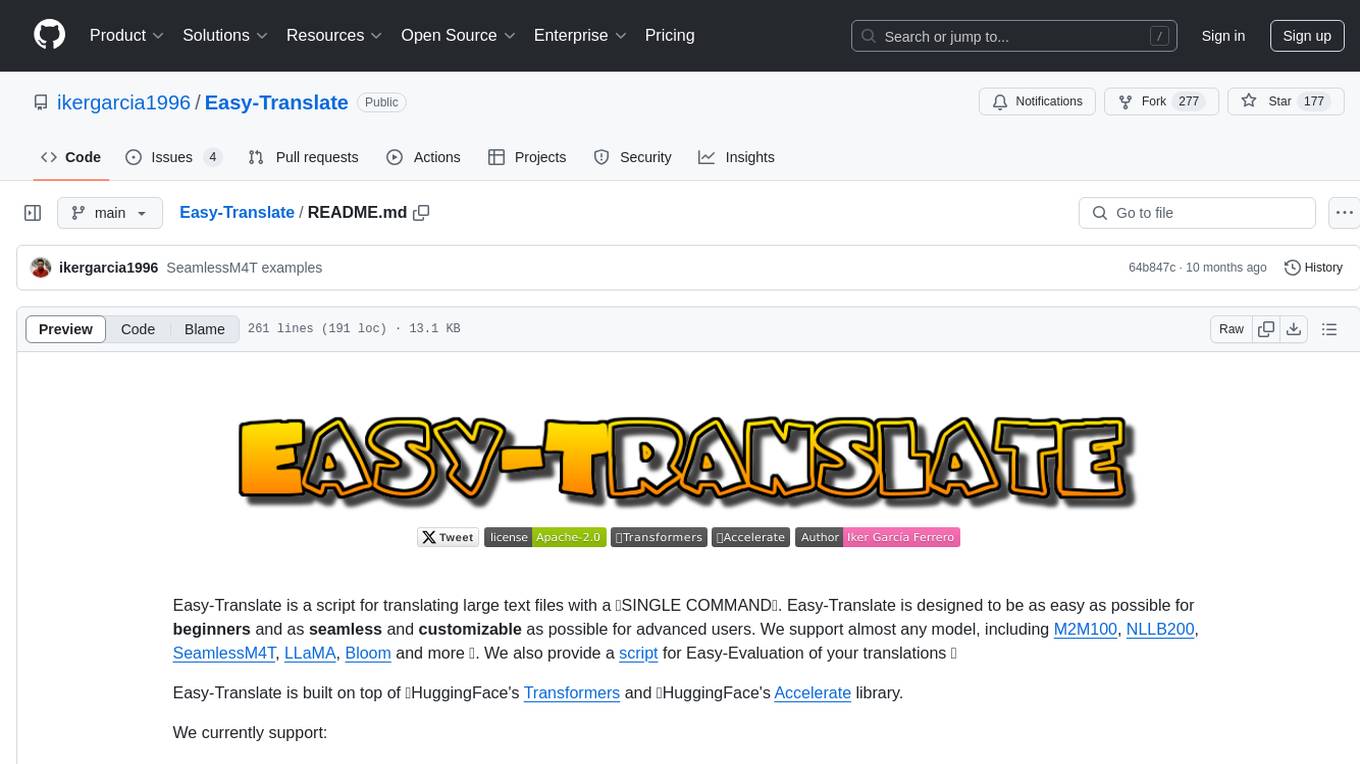
Easy-Translate
Easy-Translate is a script designed for translating large text files with a single command. It supports various models like M2M100, NLLB200, SeamlessM4T, LLaMA, and Bloom. The tool is beginner-friendly and offers seamless and customizable features for advanced users. It allows acceleration on CPU, multi-CPU, GPU, multi-GPU, and TPU, with support for different precisions and decoding strategies. Easy-Translate also provides an evaluation script for translations. Built on HuggingFace's Transformers and Accelerate library, it supports prompt usage and loading huge models efficiently.
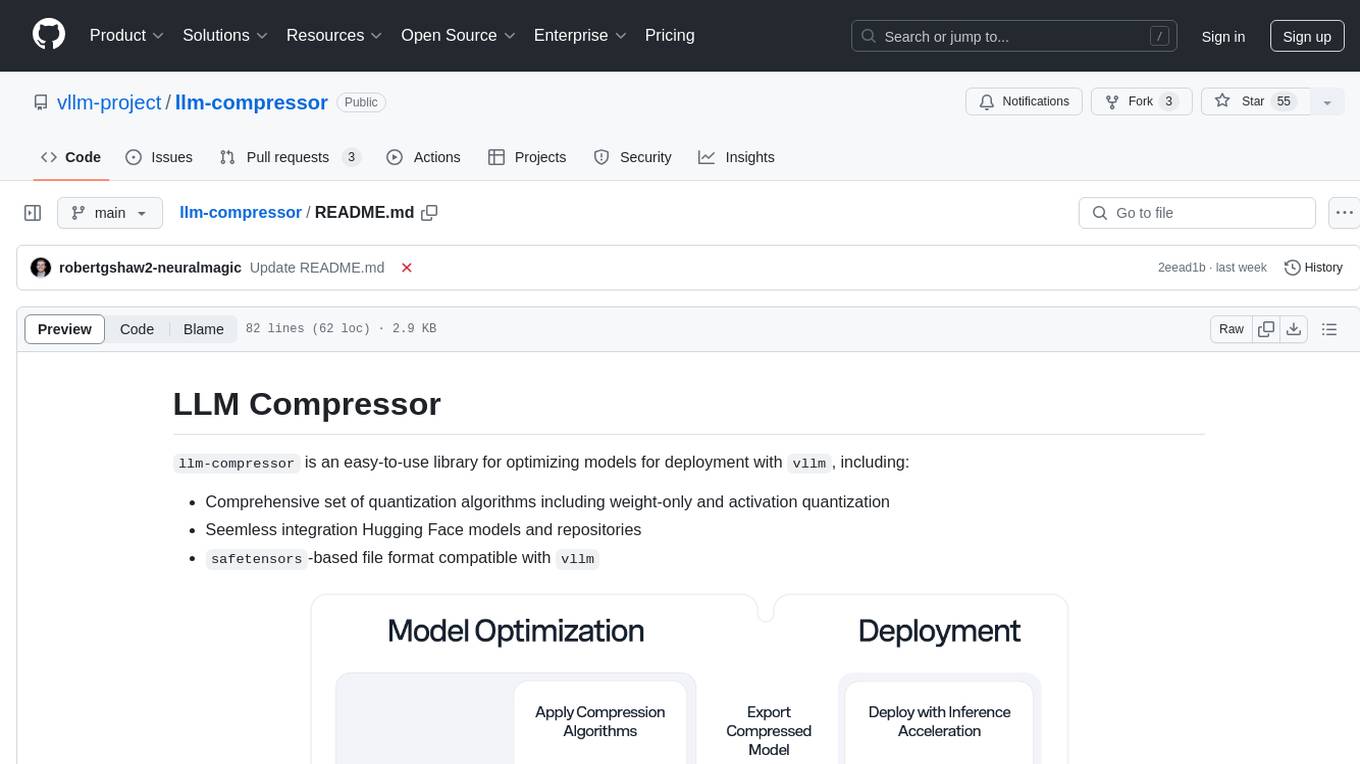
llm-compressor
llm-compressor is an easy-to-use library for optimizing models for deployment with vllm. It provides a comprehensive set of quantization algorithms, seamless integration with Hugging Face models and repositories, and supports mixed precision, activation quantization, and sparsity. Supported algorithms include PTQ, GPTQ, SmoothQuant, and SparseGPT. Installation can be done via git clone and local pip install. Compression can be easily applied by selecting an algorithm and calling the oneshot API. The library also offers end-to-end examples for model compression. Contributions to the code, examples, integrations, and documentation are appreciated.

open-parse
Open Parse is a Python library for visually discerning document layouts and chunking them effectively. It is designed to fill the gap in open-source libraries for handling complex documents. Unlike text splitting, which converts a file to raw text and slices it up, Open Parse visually analyzes documents for superior LLM input. It also supports basic markdown for parsing headings, bold, and italics, and has high-precision table support, extracting tables into clean Markdown formats with accuracy that surpasses traditional tools. Open Parse is extensible, allowing users to easily implement their own post-processing steps. It is also intuitive, with great editor support and completion everywhere, making it easy to use and learn.
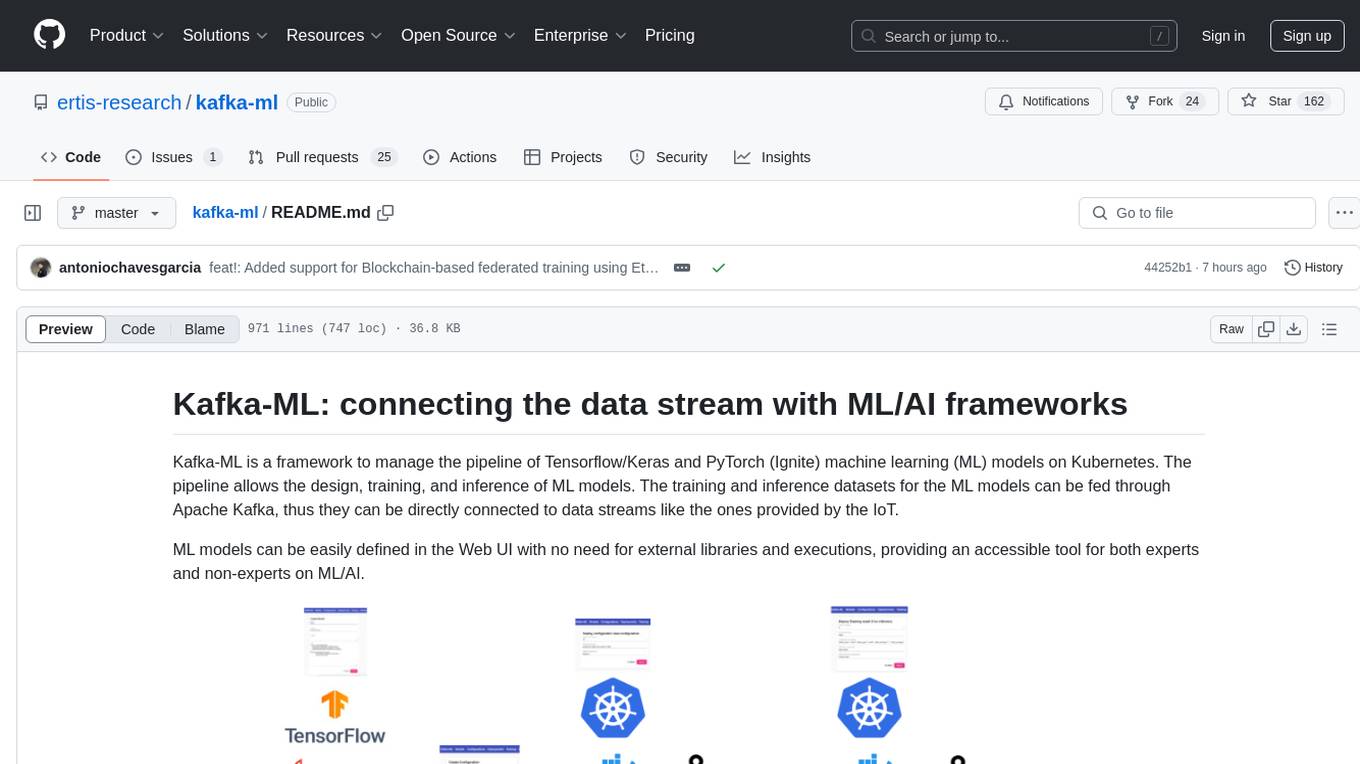
kafka-ml
Kafka-ML is a framework designed to manage the pipeline of Tensorflow/Keras and PyTorch machine learning models on Kubernetes. It enables the design, training, and inference of ML models with datasets fed through Apache Kafka, connecting them directly to data streams like those from IoT devices. The Web UI allows easy definition of ML models without external libraries, catering to both experts and non-experts in ML/AI.
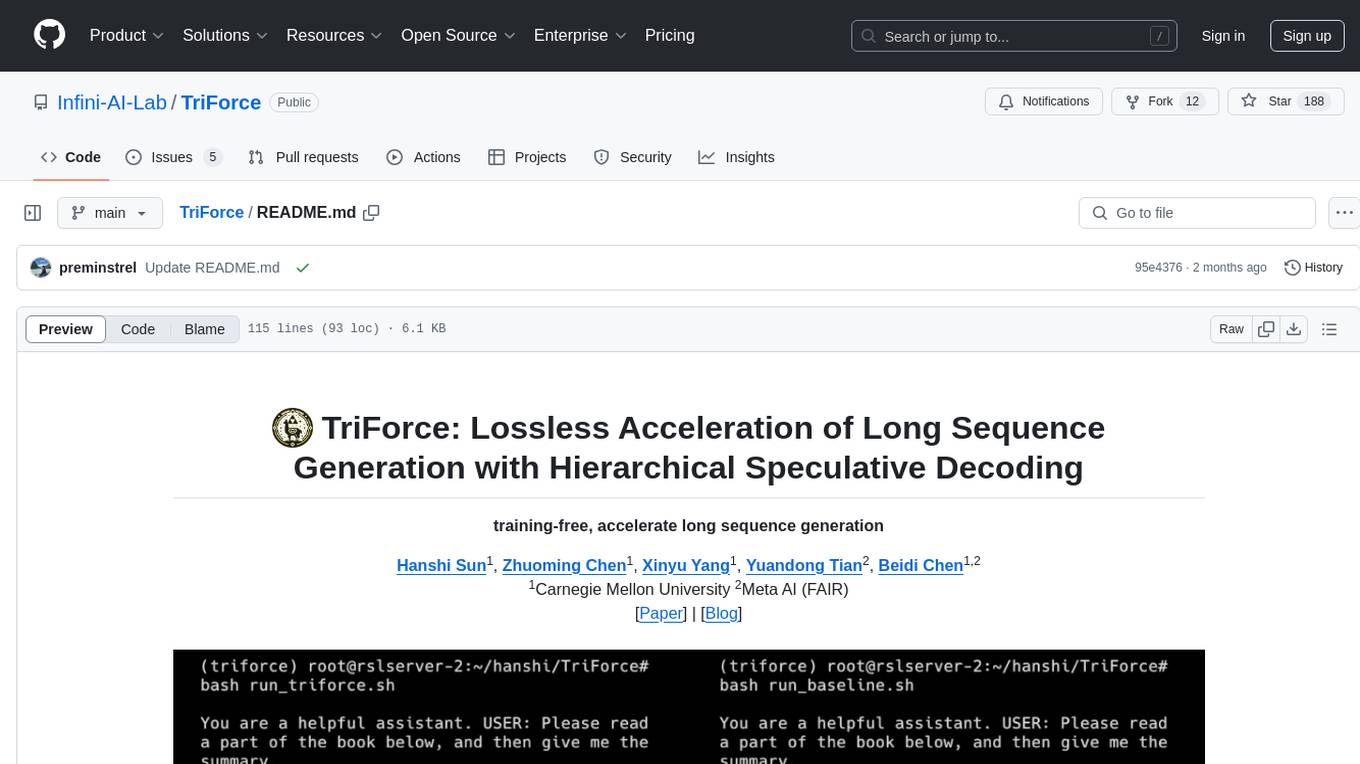
TriForce
TriForce is a training-free tool designed to accelerate long sequence generation. It supports long-context Llama models and offers both on-chip and offloading capabilities. Users can achieve a 2.2x speedup on a single A100 GPU. TriForce also provides options for offloading with tensor parallelism or without it, catering to different hardware configurations. The tool includes a baseline for comparison and is optimized for performance on RTX 4090 GPUs. Users can cite the associated paper if they find TriForce useful for their projects.
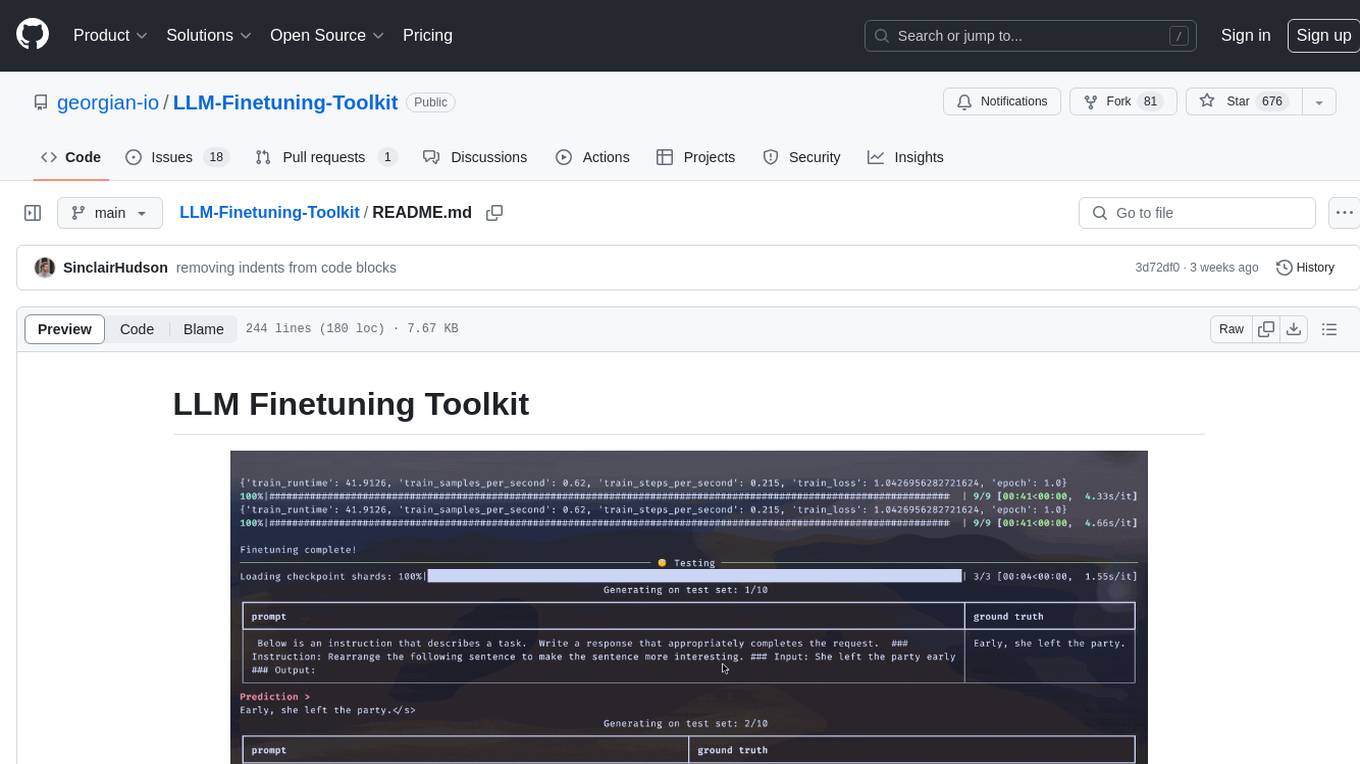
LLM-Finetuning-Toolkit
LLM Finetuning toolkit is a config-based CLI tool for launching a series of LLM fine-tuning experiments on your data and gathering their results. It allows users to control all elements of a typical experimentation pipeline - prompts, open-source LLMs, optimization strategy, and LLM testing - through a single YAML configuration file. The toolkit supports basic, intermediate, and advanced usage scenarios, enabling users to run custom experiments, conduct ablation studies, and automate fine-tuning workflows. It provides features for data ingestion, model definition, training, inference, quality assurance, and artifact outputs, making it a comprehensive tool for fine-tuning large language models.
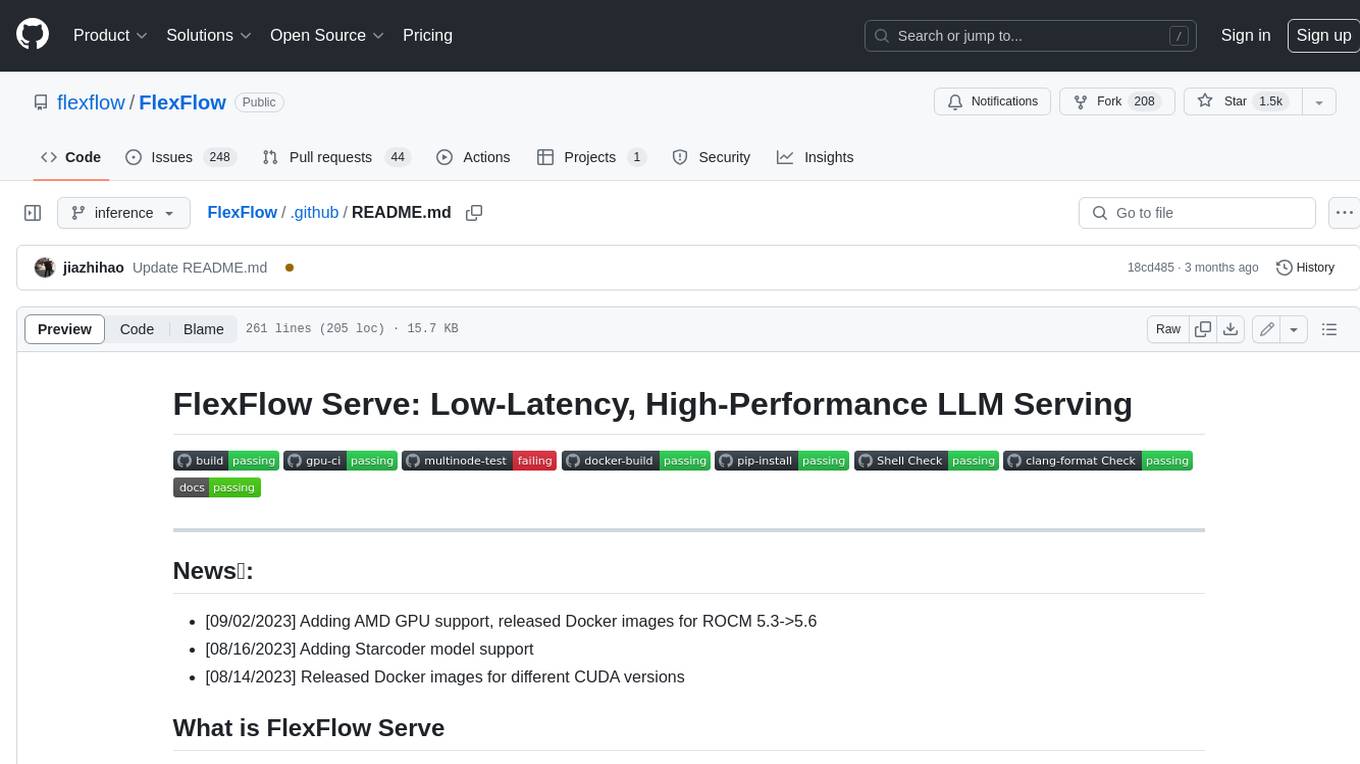
FlexFlow
FlexFlow Serve is an open-source compiler and distributed system for **low latency**, **high performance** LLM serving. FlexFlow Serve outperforms existing systems by 1.3-2.0x for single-node, multi-GPU inference and by 1.4-2.4x for multi-node, multi-GPU inference.
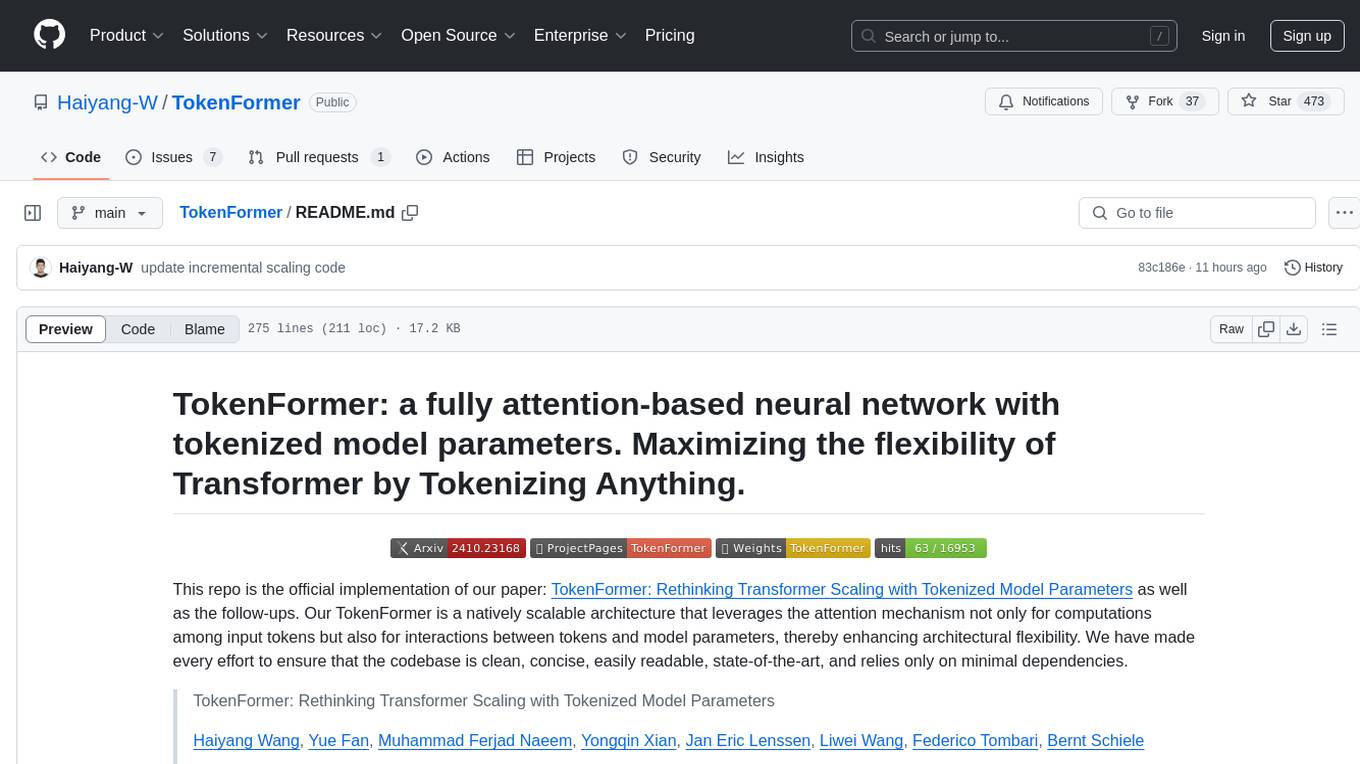
TokenFormer
TokenFormer is a fully attention-based neural network architecture that leverages tokenized model parameters to enhance architectural flexibility. It aims to maximize the flexibility of neural networks by unifying token-token and token-parameter interactions through the attention mechanism. The architecture allows for incremental model scaling and has shown promising results in language modeling and visual modeling tasks. The codebase is clean, concise, easily readable, state-of-the-art, and relies on minimal dependencies.
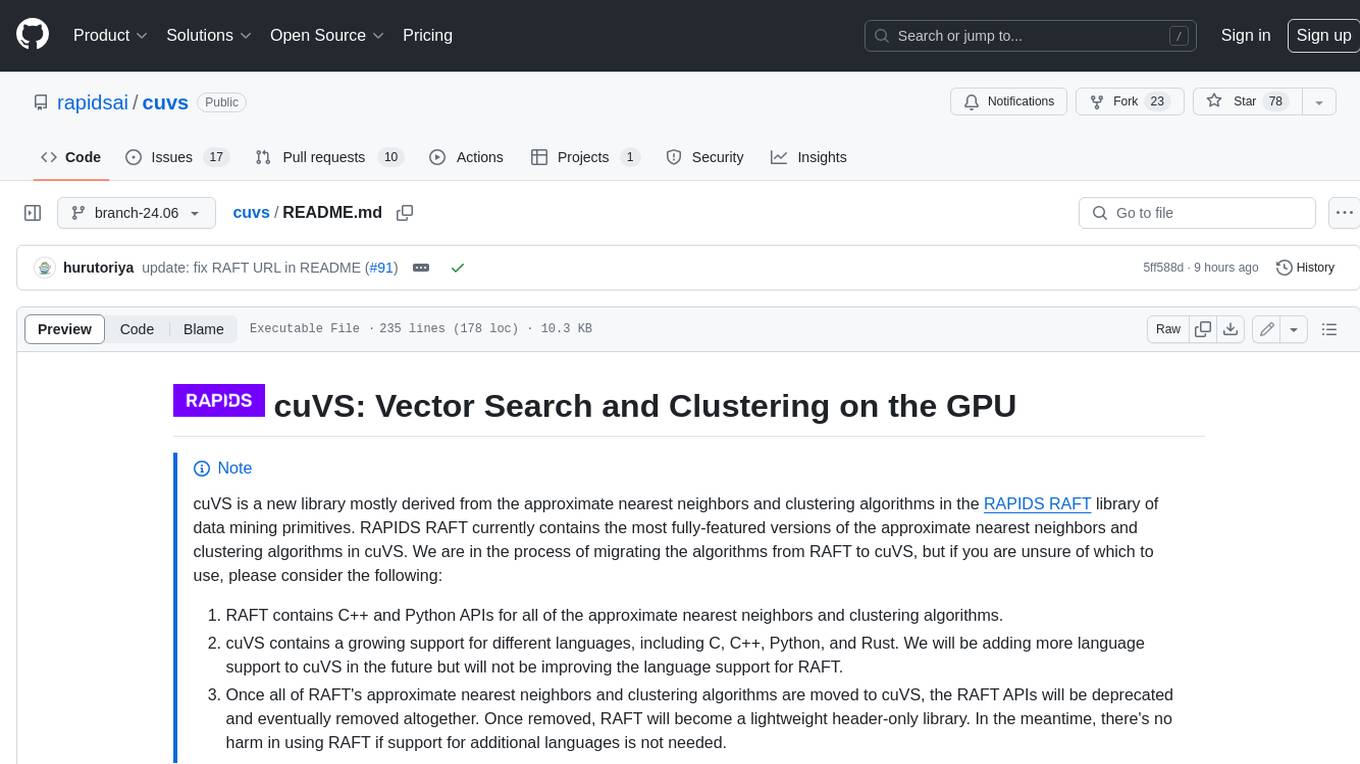
cuvs
cuVS is a library that contains state-of-the-art implementations of several algorithms for running approximate nearest neighbors and clustering on the GPU. It can be used directly or through the various databases and other libraries that have integrated it. The primary goal of cuVS is to simplify the use of GPUs for vector similarity search and clustering.
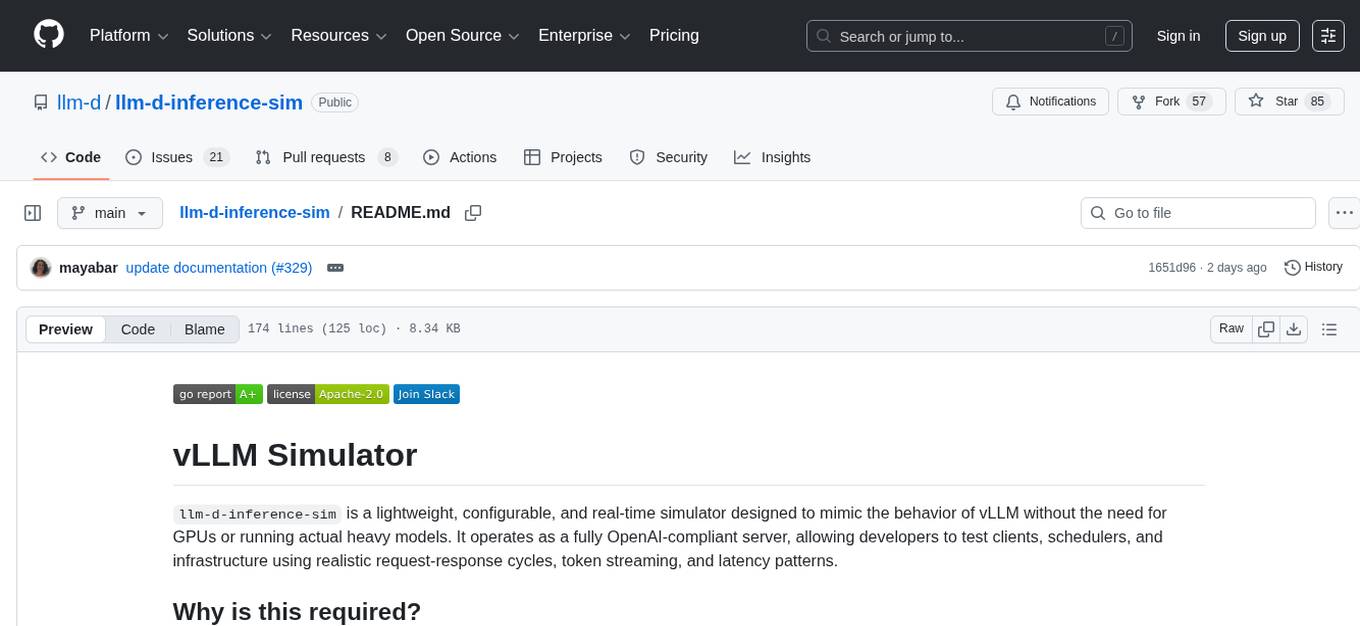
llm-d-inference-sim
The `llm-d-inference-sim` is a lightweight, configurable, and real-time simulator designed to mimic the behavior of vLLM without the need for GPUs or running heavy models. It operates as an OpenAI-compliant server, allowing developers to test clients, schedulers, and infrastructure using realistic request-response cycles, token streaming, and latency patterns. The simulator offers modes of operation, response generation from predefined text or real datasets, latency simulation, tokenization options, LoRA management, KV cache simulation, failure injection, and deployment options for standalone or Kubernetes testing. It supports a subset of standard vLLM Prometheus metrics for observability.
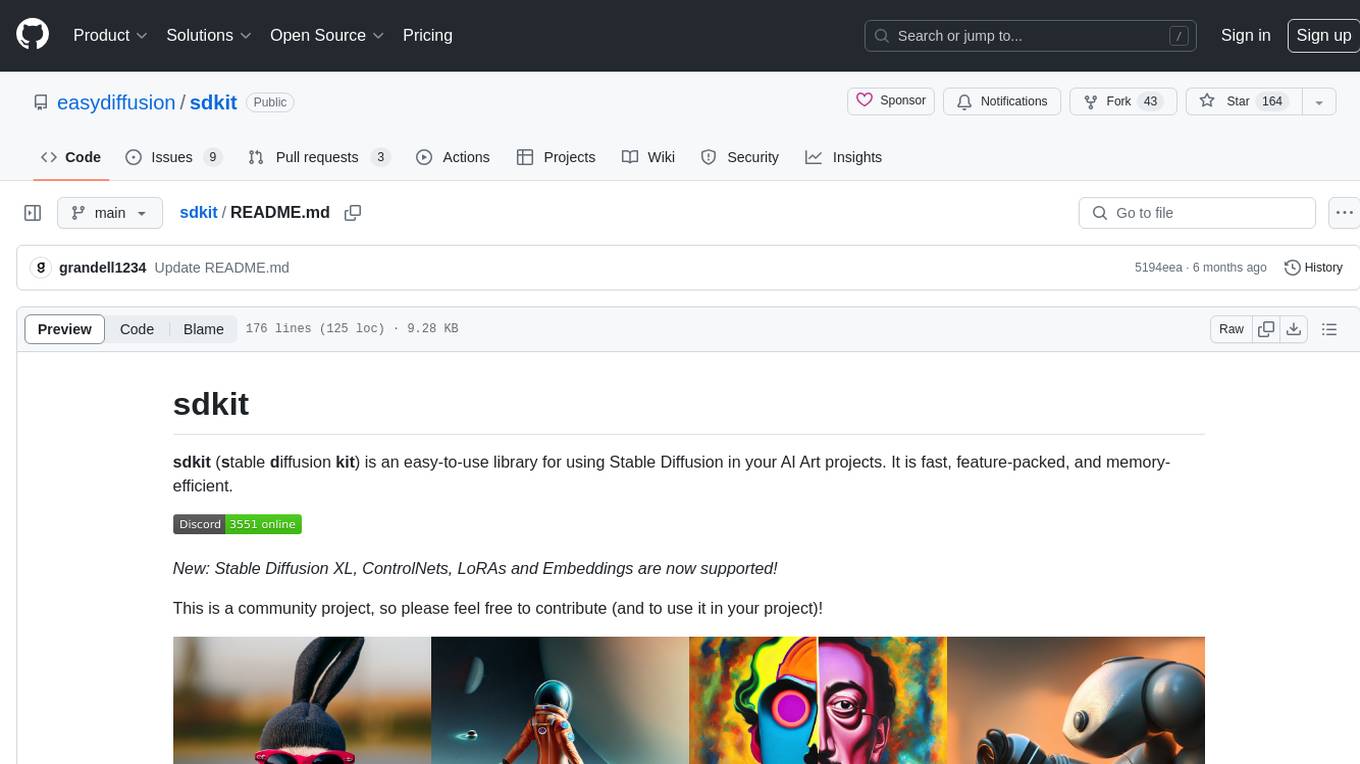
sdkit
sdkit (stable diffusion kit) is an easy-to-use library for utilizing Stable Diffusion in AI Art projects. It includes features like ControlNets, LoRAs, Textual Inversion Embeddings, GFPGAN, CodeFormer for face restoration, RealESRGAN for upscaling, k-samplers, support for custom VAEs, NSFW filter, model-downloader, parallel GPU support, and more. It offers a model database, auto-scanning for malicious models, and various optimizations. The API consists of modules for loading models, generating images, filters, model merging, and utilities, all managed through the sdkit.Context object.
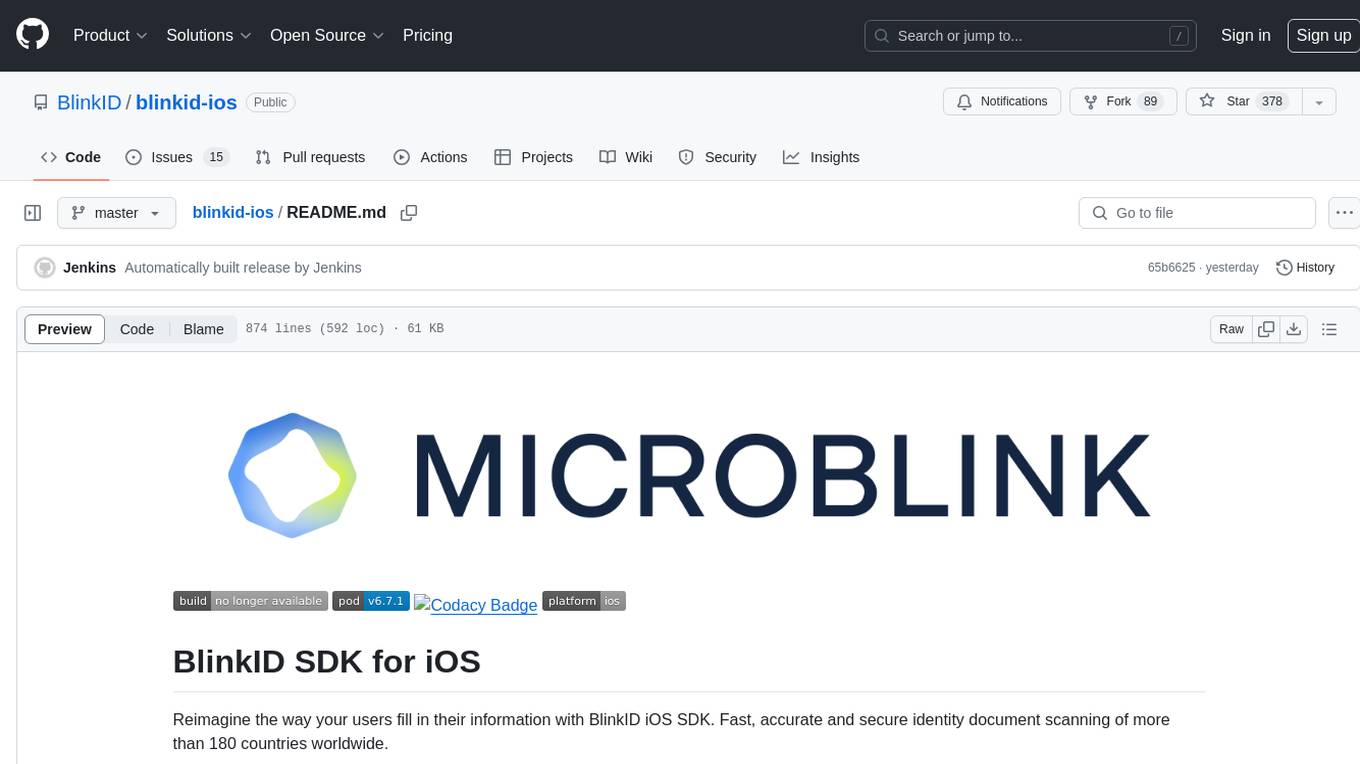
blinkid-ios
BlinkID iOS is a mobile SDK that enables developers to easily integrate ID scanning and data extraction capabilities into their iOS applications. The SDK supports scanning and processing various types of identity documents, such as passports, driver's licenses, and ID cards. It provides accurate and fast data extraction, including personal information and document details. With BlinkID iOS, developers can enhance their apps with secure and reliable ID verification functionality, improving user experience and streamlining identity verification processes.
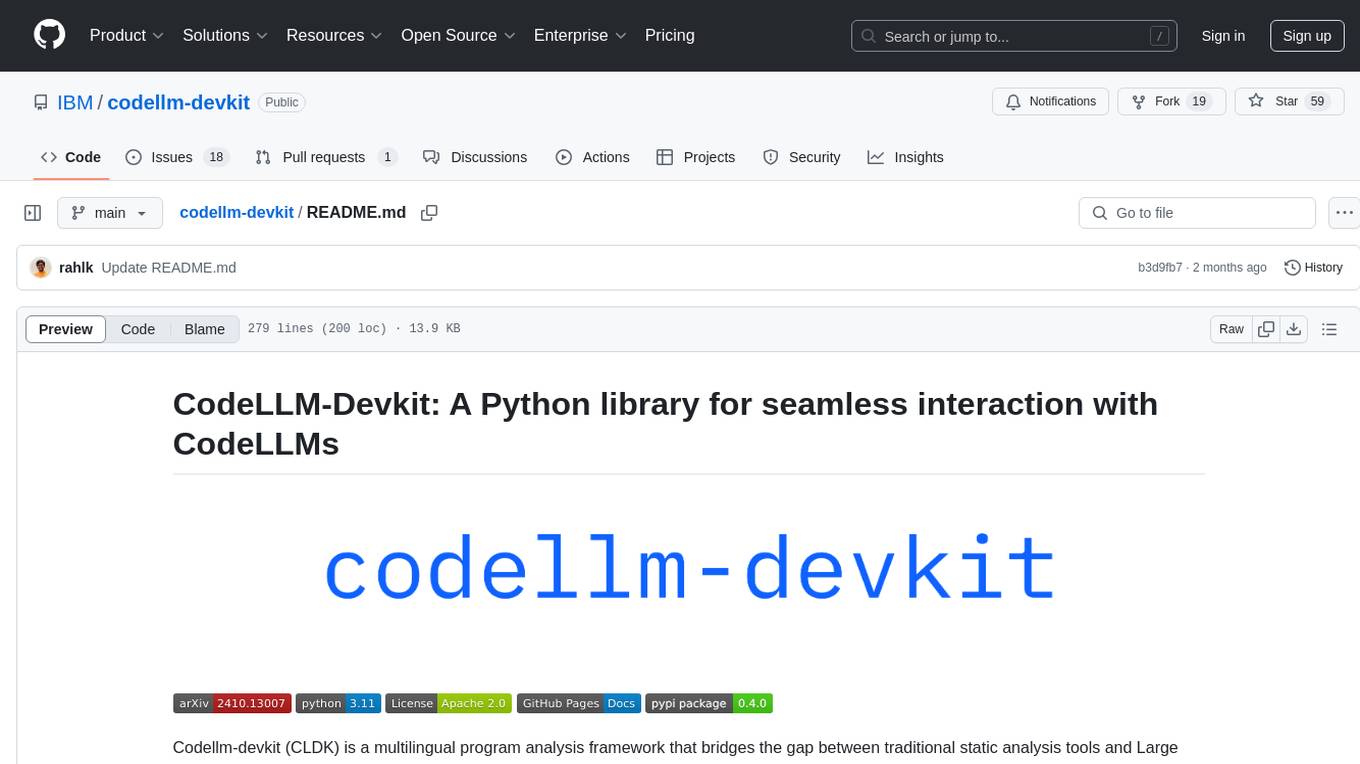
codellm-devkit
Codellm-devkit (CLDK) is a Python library that serves as a multilingual program analysis framework bridging traditional static analysis tools and Large Language Models (LLMs) specialized for code (CodeLLMs). It simplifies the process of analyzing codebases across multiple programming languages, enabling the extraction of meaningful insights and facilitating LLM-based code analysis. The library provides a unified interface for integrating outputs from various analysis tools and preparing them for effective use by CodeLLMs. Codellm-devkit aims to enable the development and experimentation of robust analysis pipelines that combine traditional program analysis tools and CodeLLMs, reducing friction in multi-language code analysis and ensuring compatibility across different tools and LLM platforms. It is designed to seamlessly integrate with popular analysis tools like WALA, Tree-sitter, LLVM, and CodeQL, acting as a crucial intermediary layer for efficient communication between these tools and CodeLLMs. The project is continuously evolving to include new tools and frameworks, maintaining its versatility for code analysis and LLM integration.
For similar tasks

zipnn
ZipNN is a lossless and near-lossless compression library optimized for numbers/tensors in the Foundation Models environment. It automatically prepares data for compression based on its type, allowing users to focus on core tasks without worrying about compression complexities. The library delivers effective compression techniques for different data types and structures, achieving high compression ratios and rates. ZipNN supports various compression methods like ZSTD, lz4, and snappy, and provides ready-made scripts for file compression/decompression. Users can also manually import the package to compress and decompress data. The library offers advanced configuration options for customization and validation tests for different input and compression types.
For similar jobs

weave
Weave is a toolkit for developing Generative AI applications, built by Weights & Biases. With Weave, you can log and debug language model inputs, outputs, and traces; build rigorous, apples-to-apples evaluations for language model use cases; and organize all the information generated across the LLM workflow, from experimentation to evaluations to production. Weave aims to bring rigor, best-practices, and composability to the inherently experimental process of developing Generative AI software, without introducing cognitive overhead.

LLMStack
LLMStack is a no-code platform for building generative AI agents, workflows, and chatbots. It allows users to connect their own data, internal tools, and GPT-powered models without any coding experience. LLMStack can be deployed to the cloud or on-premise and can be accessed via HTTP API or triggered from Slack or Discord.

VisionCraft
The VisionCraft API is a free API for using over 100 different AI models. From images to sound.

kaito
Kaito is an operator that automates the AI/ML inference model deployment in a Kubernetes cluster. It manages large model files using container images, avoids tuning deployment parameters to fit GPU hardware by providing preset configurations, auto-provisions GPU nodes based on model requirements, and hosts large model images in the public Microsoft Container Registry (MCR) if the license allows. Using Kaito, the workflow of onboarding large AI inference models in Kubernetes is largely simplified.

PyRIT
PyRIT is an open access automation framework designed to empower security professionals and ML engineers to red team foundation models and their applications. It automates AI Red Teaming tasks to allow operators to focus on more complicated and time-consuming tasks and can also identify security harms such as misuse (e.g., malware generation, jailbreaking), and privacy harms (e.g., identity theft). The goal is to allow researchers to have a baseline of how well their model and entire inference pipeline is doing against different harm categories and to be able to compare that baseline to future iterations of their model. This allows them to have empirical data on how well their model is doing today, and detect any degradation of performance based on future improvements.

tabby
Tabby is a self-hosted AI coding assistant, offering an open-source and on-premises alternative to GitHub Copilot. It boasts several key features: * Self-contained, with no need for a DBMS or cloud service. * OpenAPI interface, easy to integrate with existing infrastructure (e.g Cloud IDE). * Supports consumer-grade GPUs.

spear
SPEAR (Simulator for Photorealistic Embodied AI Research) is a powerful tool for training embodied agents. It features 300 unique virtual indoor environments with 2,566 unique rooms and 17,234 unique objects that can be manipulated individually. Each environment is designed by a professional artist and features detailed geometry, photorealistic materials, and a unique floor plan and object layout. SPEAR is implemented as Unreal Engine assets and provides an OpenAI Gym interface for interacting with the environments via Python.

Magick
Magick is a groundbreaking visual AIDE (Artificial Intelligence Development Environment) for no-code data pipelines and multimodal agents. Magick can connect to other services and comes with nodes and templates well-suited for intelligent agents, chatbots, complex reasoning systems and realistic characters.





